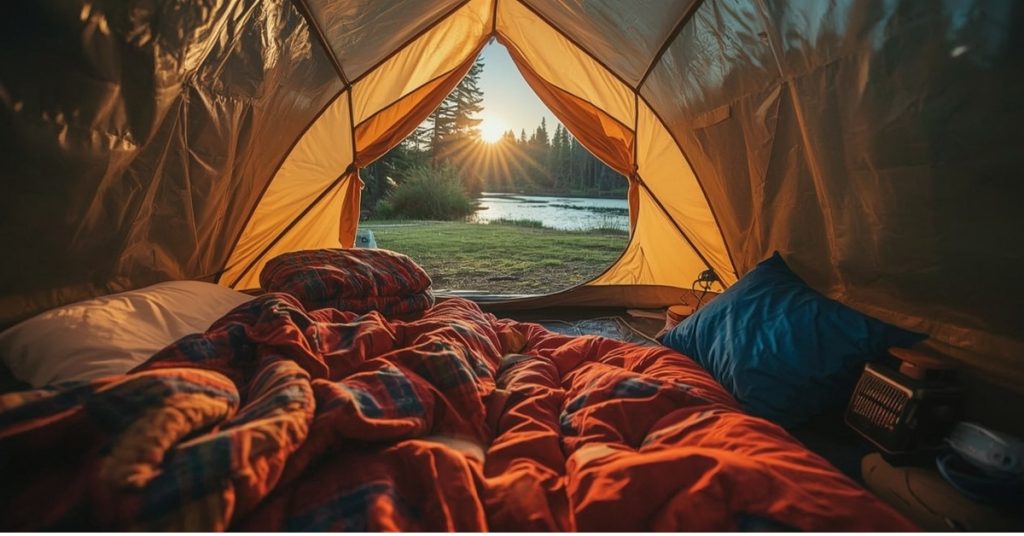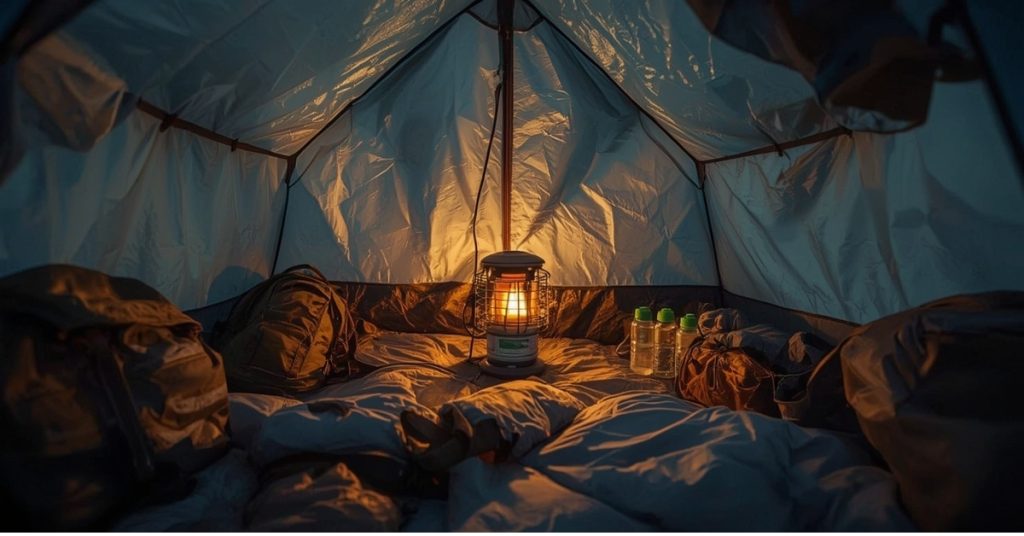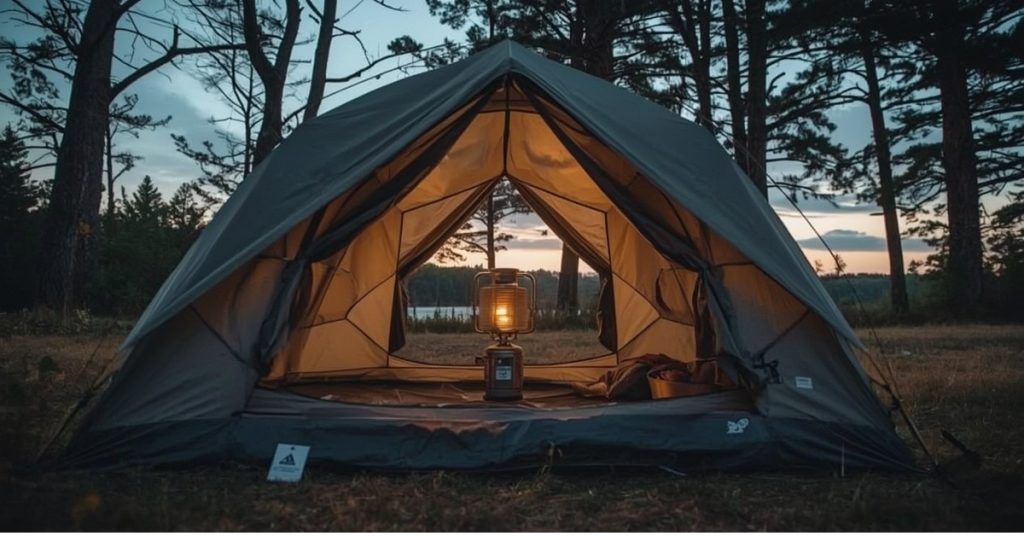As an Amazon Associate, I earn from qualifying purchases.
Cold nights can turn a perfect camping trip into an uncomfortable experience, especially when sleeping bags alone aren’t enough to keep the chill away. Many campers consider propane heaters, like the popular Buddy heater, to stay warm and extend their outdoor season. While effective, propane heaters introduce serious risks, including carbon monoxide poisoning, fire hazards, and oxygen depletion, making safety precautions essential.
With the right equipment, proper ventilation, and strict adherence to safety protocols, propane heaters can safely provide warmth inside a tent. This guide covers everything you need to know—from selecting the right heater to implementing life-saving safety practices—ensuring cozy, comfortable nights without compromising your safety while camping.
Contents
Benefits of Using a Propane Heater in a Tent

A propane heater can transform cold-weather camping by providing reliable and efficient warmth inside your tent. These heaters are portable, easy to use, and designed to quickly heat small spaces, allowing campers to stay comfortable even in freezing conditions. Modern propane heaters also come equipped with safety features such as automatic shut-off and low-oxygen sensors, giving peace of mind when used correctly.
The main advantages of propane heaters for camping include consistent heat output, portability, and cost-effectiveness compared to other heating options. When used with proper ventilation and safety precautions, they make cold-weather trips far more enjoyable, turning frigid nights into cozy, restful experiences.
Quick and Effective Heating
Propane heaters generate heat almost immediately after ignition, providing rapid relief from cold temperatures. Unlike passive heating methods that take time to warm up, a quality propane heater can raise your tent’s temperature within minutes, making it ideal for emergency warming or quick comfort after a long day outdoors.
Portable and User-Friendly Operation
Modern propane tent heaters are designed with portability in mind. Most models are compact, lightweight, and connect easily to standard propane canisters. The operation is typically straightforward, requiring only basic setup and ignition procedures that most campers can handle confidently.
Extended Camping Seasons
A reliable heating solution opens up camping opportunities during shoulder seasons and even winter months when many outdoor enthusiasts pack away their gear. This means more camping adventures throughout the year and access to beautiful landscapes during quieter, less crowded times.
Built-in Safety Features
Many propane heaters designed for indoor or tent use come equipped with important safety mechanisms. These include oxygen depletion sensors (ODS) that automatically shut off the heater when oxygen levels drop too low, tip-over switches that cut fuel flow if the unit is knocked over, and automatic shut-off features for various safety scenarios.
Safety Concerns and Risks
While propane heaters can provide excellent warmth, they also introduce significant hazards that campers must take seriously. Understanding these risks is crucial for safe operation.
Carbon Monoxide Poisoning Risk
Carbon monoxide (CO) is an odorless, colorless gas produced when propane burns incompletely. In an enclosed tent environment, CO can build up to dangerous levels quickly. Early symptoms include headaches, dizziness, weakness, and nausea, but severe exposure can lead to unconsciousness and death. The enclosed nature of tents makes proper ventilation absolutely critical.
Fire Hazard Potential
Propane heaters produce open flames or extremely hot surfaces that can ignite tent materials, sleeping bags, clothing, or other camping gear. Tent fabrics are often synthetic materials that can melt and burn rapidly. Poor placement of heaters near tent walls or flammable items has caused numerous camping accidents and tent fires.
Oxygen Depletion Concerns
Burning propane consumes oxygen from the surrounding air. In a sealed tent environment, this can lead to dangerously low oxygen levels, causing difficulty breathing, confusion, and potentially loss of consciousness. This risk is particularly high in smaller tents or when multiple people are sharing the space.
Physical Injury Risks
Hot surfaces on propane heaters can cause severe burns if touched accidentally. Additionally, heaters that are knocked over or improperly positioned can cause burns, start fires, or create gas leaks. The confined space of a tent increases the likelihood of accidental contact with hot surfaces.
How to Safely Use a Propane Heater in a Tent

If you decide to use a propane heater in your tent, following strict safety protocols is non-negotiable. These guidelines can mean the difference between a comfortable camping experience and a dangerous situation.
Choose the Right Heater
Select a propane heater specifically designed for indoor use or tent camping. Look for models with oxygen depletion sensors (ODS), which automatically shut off the heater when oxygen levels become dangerously low. Tip-over safety switches are another essential feature that cuts off gas flow if the heater is knocked over. Popular options include certain Buddy heater models that are designed for indoor use.
Ensure Adequate Ventilation
Proper ventilation is absolutely critical when using any propane heater in a tent. Always maintain cross-ventilation by opening tent vents or leaving a small gap in windows or doorways. This allows fresh air to enter while enabling dangerous gases to escape. Never operate a propane heater in a completely sealed tent, regardless of the heater’s safety features.
Proper Placement and Setup
Position your heater on a stable, level surface away from tent walls, sleeping bags, and any flammable materials. Maintain at least three feet of clearance around the heater in all directions. Place the heater near the center of the tent if possible, and never position it directly under tent walls or rain flies that could droop down and contact the heater.
Never Leave Unattended
Always extinguish the propane heater before sleeping or leaving the tent unattended. The risks of carbon monoxide buildup, oxygen depletion, or fire hazards are too great to leave a heater running without supervision. Use the heater to warm the tent, then turn it off before sleep.
Use Carbon Monoxide Detection
If possible, bring a battery-powered carbon monoxide detector designed for camping. These devices can provide early warning if CO levels become dangerous. Place the detector away from the heater but within the tent’s living space for accurate readings.
Follow Manufacturer Instructions
Read and follow all manufacturer guidelines for your specific heater model. Pay attention to altitude restrictions, proper fuel connections, maintenance requirements, and safety warnings. Different heaters may have specific operational requirements that are crucial for safe use.
Alternative Heating Methods for Tents

Staying warm in a tent is essential, but safety must come first. While propane heaters are effective, there are safer alternatives that reduce fire and carbon monoxide risks. Electric heaters provide consistent warmth when power is available, while battery-powered heating pads and blankets offer portable, targeted heat.
Low-tech solutions like hot water bottles, candle lanterns, and layered insulation can also keep tents cozy without relying on fuel-based heaters. By combining these methods with proper ventilation and insulation, campers can enjoy a warm, comfortable, and safe tent environment in cold weather.
Electric Heaters for Powered Campsites
If you’re camping at sites with electrical hookups, electric space heaters offer a safer heating option. They don’t produce carbon monoxide or consume oxygen, though you should still maintain proper ventilation and keep them away from flammable materials. Electric heaters are particularly suitable for RV camping or cabin tent setups.
Catalytic Heaters
Catalytic heaters use a flameless combustion process that burns propane more completely, producing less carbon monoxide than traditional flame heaters. While still requiring ventilation, they’re generally considered safer for enclosed spaces. However, they still consume oxygen and require the same safety precautions as other propane heating methods.
Passive Warming Solutions
Hot water bottles filled with heated water can provide localized warmth throughout the night without any ongoing combustion risks. High-quality sleeping bags rated for cold temperatures, combined with proper layering systems, can often eliminate the need for active heating altogether.
Body Heat Retention Strategies
Insulated sleeping pads provide crucial ground insulation, while wearing appropriate base layers and using sleeping bag liners can significantly improve warmth retention. These methods work together to trap and maintain your body’s natural heat without introducing external heat sources.
FInal Verdict
Using a propane heater in your tent can keep you cozy, but only with the right equipment, proper ventilation, and strict adherence to safety guidelines. Always choose heaters rated for indoor use, never leave them unattended, and follow manufacturer instructions. Pairing brief, supervised heating with quality cold-weather gear can maximize comfort without compromising safety. Remember: no warmth is worth risking carbon monoxide poisoning or fire. Prioritize safety, plan carefully, and enjoy cold-weather camping with confidence.
Frequently Asked Questions
Can propane heaters cause carbon monoxide poisoning?
Yes. Propane heaters can produce dangerous levels of carbon monoxide, especially in enclosed spaces like tents. This occurs when propane burns incompletely due to insufficient oxygen or poor ventilation. Always ensure adequate airflow and consider using a carbon monoxide detector for early warning.
What kind of propane heater is safe for tents?
Choose propane heaters labeled for indoor use with safety features such as oxygen depletion sensors (ODS) and tip-over shutoffs. Outdoor-only heaters should never be used inside tents. Some Buddy heater models are designed for indoor use and can be safely used in tents when proper precautions are followed.
Is ventilation really necessary when using a propane heater?
Absolutely. Proper ventilation is critical with any combustion heater in an enclosed space. Ventilation allows fresh oxygen to enter and enables carbon monoxide and other combustion gases to escape. Never use a propane heater in a completely sealed tent, even if it has safety features.
Can I use a propane heater overnight in my tent?
No. Leaving a propane heater running unattended, especially while sleeping, is extremely dangerous. Risks include carbon monoxide poisoning, fire, and oxygen depletion. Use the heater to warm your tent before sleep, then turn it off and rely on proper sleeping gear for overnight warmth.
Are there safer alternatives to propane heaters for tent heating?
Yes. Safer options include electric heaters (if power is available), high-quality cold-weather sleeping systems, hot water bottles, and catalytic heaters. The safest approach combines proper cold-weather gear with active monitoring of any heating equipment.
As an Amazon Associate, I earn from qualifying purchases.
